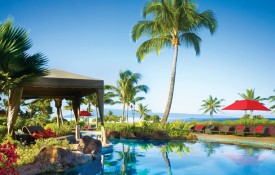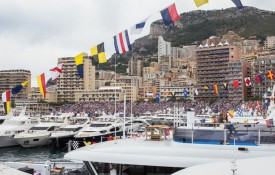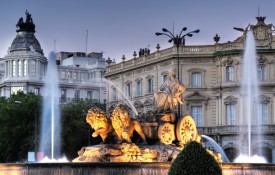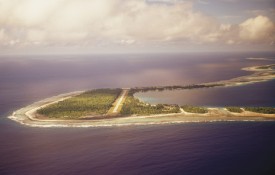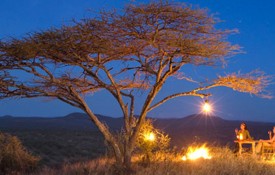The fantasy of luxuriating in an overwater bungalow is the bucket-list island experience travelers typically seek when dreaming of the Maldives, Bora Bora, and Fiji. But this castaway fantasy now has a new address, in another faraway land—and with a twist.
Say hello to Bawah Reserve, a private island paradise—overwater bungalows included—lost among Indonesia’s Riau Islands, some 150 nautical miles off Singapore. Unlike those before it, Bawah isn’t a single dreamy island. The reserve comprises an entire archipelago: six stunning islands, three blue lagoons, and 13 white sand beaches. It accommodates just 70 guests in 35 suites but offers a myriad of dining options, activities, and amenities, matching far larger ultra-luxury resorts. This is next-level private island splendor, unmatched in any other part of the world.

Bawah is located 150 nautical miles from Singapore.
The adventure begins with a grand seaplane arrival. Circling before touchdown, the tiny plane’s passengers erupt in “oohs and aahs” over Bawah’s sheer beauty: low-lying, palm-studded islets contrast larger, high-rising granitic islands blanketed in dense jungle canopy, all framed by blue-ombré waters and encircled by a continuous coral reef. Exiting onto a floating wooden footbridge, Bawah’s manmade marvels soon come into view: 11 wooden overwater bungalows, 24 safari-inspired tented suites, the open-air Aura spa complex, and four design-forward restaurants, including one in the treetops and one in the sand (with swing chairs, no less). To minimize impact on the natural environment, all guest rooms and amenities are constructed along the principal island’s southern perimeter. And to harmonize with nature, all are designed with both sustainably and style in mind, reflected in the artful use of local timber, driftwood, island stones, rope, bamboo, recycled copper, and canvas over transitional indoor-outdoor spaces.

Accommodations are designed with sustainability and style in mind.
The sublime scene is now set, but exactly how you maximize it is up to you. Bawah’s all-inclusive rate (starting at $1,780/night) means that unlimited dining (minus alcohol) and activities (except diving) are fair game, as are daily spa treatments (yes, you can get a 60-minute massage per day). It’s entirely possible to disappear into your private eco-chic sanctuary, relishing the views (and room service) during languid days, exiting only for a daily deep tissue or a walk along the massive sandbars at low tide.
Alternatively, immerse completely in Bawah’s natural bounties. Try self-guided or group snorkeling trips; the biodiversity in this marine conservation area is off the charts. Hike up to five different trails through the jungle. Take the one-hour Blue Trail for the best bird’s-eye views of the reserve or the hour-long Orange Trail to ogle Bawah’s granite pinnacles. Choose between nine different reefs as dive sites, depending on your skill set and species goals. The Muerba Reef showcases some of the healthiest coral formations in the region, teeming with black gorgonian fan coral and prolific schools of bumphead parrotfish, angelfish, rabbitfish, and black-tipped reef sharks. Grab a see-through kayak or hitch a five-minute speedboat ride and head to the other surrounding islands, snagging a beach all to yourself. With advance notice, staff stock the island with a gourmet lunch, cocktails, and loungers in anticipation of your arrival.

A see-through kayak is just one way to explore the area.
A major bonus for foodies: While plenty of Western items can be found on the menus (from grilled meats to fresh pastas and house-made pizzas), it’s the authentic Indonesian and pan-Asian dishes that stand out. Discover mie goreng (an Indonesian stir-fried noodle dish), charred and marinated sotong with gado gado (squid skewers with blanched local greens in a spicy peanut sauce), and pepes ikan (steamed fish in banana leaf with coconut and lemongrass-infused rice). Bawah’s four restaurants—Treetops, Jules Verne Bar, Grouper Bar, and Boat House—are covered but open air, lending picture-perfect vistas, beach-conscious menus, casual ambience, and an overall subdued vibe.

The property features 13 private beaches.
Given Bawah’s latitude at just two degrees north of the equator, there’s no bad time to visit—sunny, hot, and mildly humid conditions are the norm. Dry season technically runs June to October and rainy season November to March, but the latter typically spells short, sudden showers. Though Bawah is just 150 miles from Singapore, it receives half the amount of annual precipitation (read: don’t look to Singapore’s weather as a guide).
That said, don’t wait too long to visit Bawah. Not (only) because of global climate change, but because the reserve, which opened in early 2018, is still a travel secret. Many have done Bora Bora. Few have experienced this next-generation Shangri-la. And, as if the overwater love nests and beach tents weren’t enough, in 2020 Bawah is set to introduce Elang, a resort-within-a-resort concept on its own eponymous island. Guests of Elang’s five multi-bedroom villas will be privy to exclusive use of the island, its private restaurant bar and beaches included, and have free rein over the rest of greater Bawah’s enticements. Be still our jet-setting hearts. –bawahreserve.com
Getting there: Reaching this far-flung paradise takes time, but the process is seamless. Fly direct on Singapore Airline’s new Airbus A350-900ULR (ultra-long-range aircraft) from Newark to Singapore’s Changi Airport, leaving one morning and landing the next day’s early evening. Stay overnight in Singapore. Next, rise and shine as the Bawah team takes over logistics: They’ll collect you from your hotel and escort you on a quick one-hour ferry to Singapore’s neighboring island, Batam, Indonesia, from which you’ll hop on a 75-minute seaplane to Bawah, arriving by lunchtime. Note that all of these transfers (minus the hotel) are bundled into the reserve’s all-inclusive policy.







































